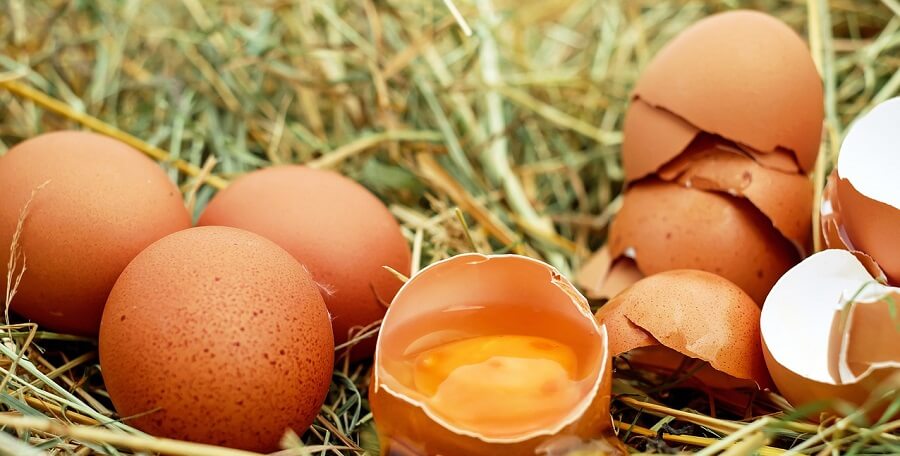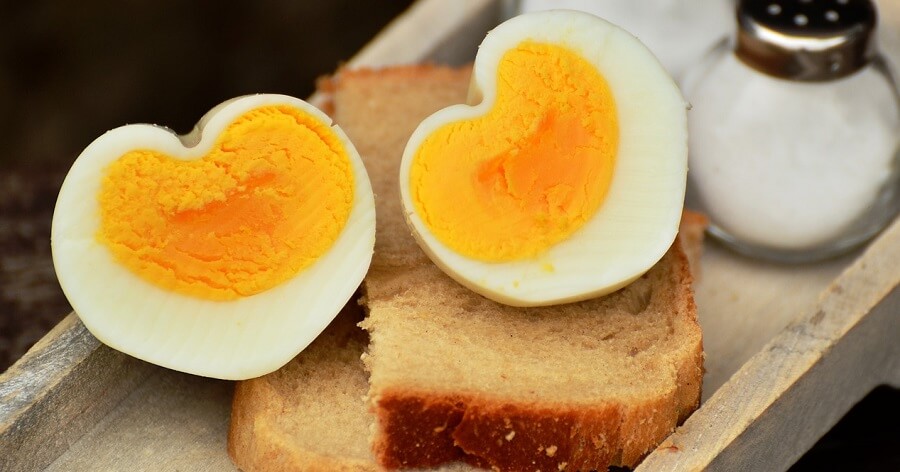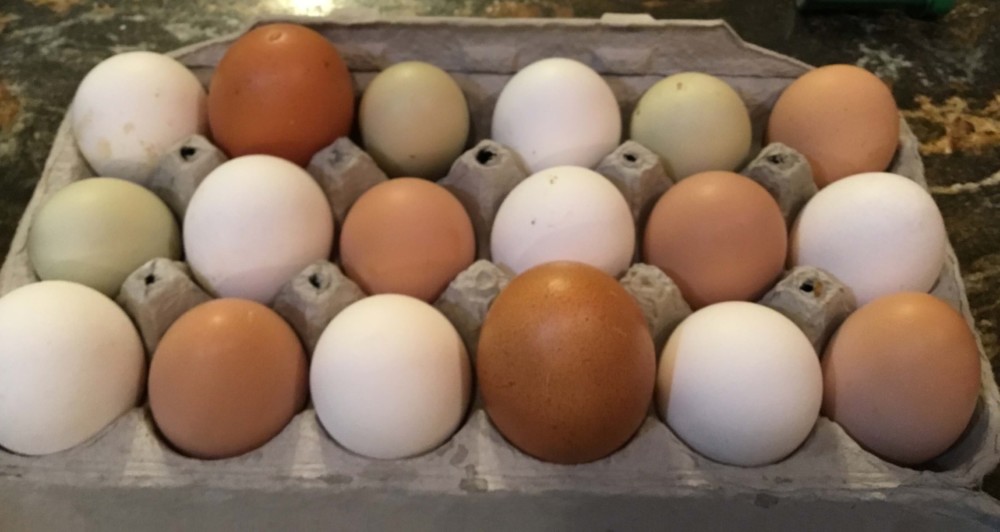Farm fresh eggs are amazing until they’re not. Occasionally, you may have, one of your chickens lay a rotten egg. What causes it? How can you fix it?
Most eggs stay good for a very long time. Farm-raised eggs have more nutrients and are good much longer than store-bought eggs. But, if you have an egg that goes bad quickly or is bad when it is laid, there are several things that could cause the issue.
What makes chickens lay rotten eggs? There are several reasons why chickens may lay a rotten egg including a poor diet that introduces bacteria into the chicken, the health of your chicken, or a defect in the egg that allows bacteria in.
It’s not always easy to figure out what the solution or cause is. Let’s dive in deeper.
In rare cases, feeding your chickens bad food may introduce bacteria or fungus into your chicken’s internal processes. It’s never a good idea to feed your hens moldy or rotten food because chickens are very susceptible to respiratory illnesses.
In addition, most of what you feed a chicken, usually end up in the food. For example, if your chicken eats a lot of fish, you may end up with fish-tasting eggs.
Bad food can introduce bacteria that get into your hens’ reproductive tract and infect the egg. If you do not feed your hens bad food, there may be a problem with the commercial feed you are feeding your chickens.
Another problem is that a hen may have internal health issues within their left ovary. Hens produce eggs out of their left ovary. Their right shrinks right after the chicks hatch.
If the reproductive system gets an infection, bacteria, or other health problems, then the natural good bacteria and other egg protectors in place from mother nature stop working. This allows bacteria into the egg while it is forming and can cause an already-bad egg to be laid.
Lastly, the egg may have a defect. Eggs are made by mother nature to be tough. Even when they are not refrigerated for several days, they are often still good.
But, if the eggshell has a crack, a hole, is too thin, or another defect, it can allow bacteria into the yolk. This will cause the yolk and egg white to go rotten quickly.
- A chickens diet may cause rotten eggs
- The hen’s ovary and internal health can affect the eggs
- The egg’s defect may allow bacteria into the egg
The solution will depend on the cause of your bad egg. There are several steps you can take.
How To Stop A Chicken From Laying Rotten Eggs
The steps to stop a chicken that’s a rotten egg-layer are as varied as the causes. But, there are several steps I would take.
First, double-check that your hens are eating quality food. If you are feeding them table scraps, then make doubly sure that the scraps are not rotten, moldy, rancid, or bad in any way.
Check around the chicken run and make sure that there isn’t anything else the chickens maybe munching on that are bad. Chickens are omnivores so a dead animal may become dinner.
Stranger things have happened.
If you can’t find anything wrong with the food your chickens are eating, and you are buying feed for them, it may be worthwhile to change the feed and see if it makes a difference.
Try medicated feed that can help to kill the bacteria.
Next, check the eggs. Are they lovely beautiful eggs or are there irregularities in the eggs?
Shells that are super hard, inconsistent in their hardness (thin in places and hard in places), or paper-thin are all eggshells that can let in bacteria. Cracked eggs also let in bacteria.
If your chicken eggs show signs of poor egg health, then take steps to improve egg health. The most common issue that causes bad egg health are:
- Old Chicken laying bad eggs (there is no cure)
- Insufficient Calcium
- Excessive bullying that keeps chickens from properly eating
There are other less-common issues, but these are the main ones. If your chicken is being bullied, check out this article on how to cure chicken bullies. If it’s a calcium issue, then a simple oyster shell supplement will do the trick. My resources page has my recommended supplement for chickens.
But, if your chicken is getting old, then there really isn’t a cure for irregular eggs. Chickens that have been bred to be egg layers usually only live 3-4 years and will lay a set amount of eggs.
Once they run out of eggs, they won’t lie anymore. As their reproductive system wears out, it can impact the quality of the egg.
How To Tell If Your Chicken’s Eggs Are Bad
One of the more reliable ways to tell if your eggs are bad before you crack them is the floating test.
If you’re unsure whether an egg is old and stale, there are a few ways to check.
- Fill a bucket ¾ of the way with water. A fresh egg lies on its side on the bottom. A rotten egg floats to the top. This happens because the air at the top of the egg gets bigger as the egg gets old, which makes it float.
- If you’re planning to use more than one egg and you’re worried one might be rotten, crack them in a bowl individually so you don’t contaminate any good ones.
- Use a candling unit or flashlight to check the egg. The larger the air pocket you see when the egg is lit up, the older the egg is.
Rarely, are sinking eggs bad. But, there have been a few cases, where a sinking egg has been cracked and the yolk was discolored, missing, or had other issues.
So the last test, for eggs that have passed the first test, is your nose and eyes. If an egg yolk looks odd, smells bad, or alerts your senses, trust your eyes, nose, and taste buds.
How To Tell Visually If An Egg Is Bad
When you crack an egg, check it visually. If bacteria or fungus got into the egg, you’ll normally find black, red, or green rot inside the egg. It will also smell horrible as soon as you crack it.
Other times, it might not be as obvious but you’ll soon smell the bad egg and if you don’t smell it, you’ll surely know once you take a bite.
Types Of Egg Bacteria And How To Identify Them
There are several major culprits of contamination. They’re big scientific terms but take a look anyway:
- Alcaligenes
- Acinetobacter
- Pseudomonas
- Serratia Cloacae
- Hafnia
- Citrobacter
- Proteus
- Aeromonas
Black Rot
Black rot is caused by proteus and pseudomonas. The rotten egg will normally look opaque when held up to a candling light. A candling light is a simple instrument that when held under the egg lights up the shell and inside of the egg.
If you don’t have a candling light, you can use a regular flashlight. Black rot is caused by gas inside the egg. It can sometimes build up enough that the shell of the egg bursts. It may also seem to explode when cracked.
Green Rot
Green rot is caused by the bacteria pseudomonas. This is often found on the shell of the egg but sometimes multiplies. It gives the egg a fluorescent green color as well as a musty smell.
Blood Rings and Embryo Chicks
The color in a rotten egg is usually called blood rings or caused by embryo chicks. It’s caused by germ development. In a fertile egg, an embryo develops a circulatory system. If the embryo dies, blood drains to the outer edge of the egg. Under a candling light, it appears as a blood-red circle.
While the structure of the egg provides a pretty good defense against bacterial contamination, it’s still possible.
How To Prevent Eggs From Going Bad Prematurely
There are several reasons that eggs can go bad quicker than normal. Fortunately, that means there are several things you can do to reduce eggs going bad. The most common cause of good eggs going bad are:
- Contamination
- Improper washing
- High storage temperature
- Old eggs
- Food your chickens are eating
- Infection in hen’s oviduct
Contamination of Eggs
Contamination can come from so many different sources that an egg might come into contact with.
For example, if an egg is contaminated with salmonella it can be passed to the egg through the chicken’s intestinal tract, it’s feces, nesting material, dust, a dirty storage container, and even humans.
Remember to wash your hands after you gather eggs. The outside of an egg can have salmonella, which may not affect the inside. But, you can spread it by failing to wash your hands after you handle your chickens or eggs.
Preventing contamination in the coop is pretty simple if you are attentive to how you set up your coop.
- Put the nesting boxes away from the roosting area. If you put the nesting boxes near the roosting area, guess what falls in…that’s right, chicken poop and lots of it.
- Place the nesting boxes away from the coop door. Your chickens are likely to have dirt and mud and who knows what else on their feet when they first walk in the coop.
- Freshen the nesting boxes up each day. Clean any feathers, chicken poop, dirt, and debris from the box and add a fresh straw if it needs it.
- Collect eggs a couple of times a day rather than just once.
Another way to prevent contamination is by keeping the chickens’ water and feed dishes clean. A combination of 10 percent bleach and 90 percent water will disinfect the dishes while not harming the chickens. Weekly cleaning is a good idea.
You also need to keep the coop clean and dry to prevent contamination. If you do spot checks daily, replace the bedding once a week and do a thorough, deep cleaning two times a year, you should be good.
Here are a few other tips to prevent contamination:
- Change clothes before handling your chickens if you’ve been around another flock
- Limit visits from others who have chickens
- Prevent interaction between your chickens and wild birds
- Keep new chickens in a different coop for at least 30 days before adding them to your flock
Improper Washing of Eggs
Obviously, if your egg is not washed, there’s the chance that if there are bacteria on the egg, it could enter the egg if there’s some defect in the egg you can’t see.
Healthy eggs actually come with good bacteria, called bloom, on the outside of the egg that helps to keep it fresh longer.
This is a natural, anti-bacterial protectant on the egg. Washing your fresh eggs means that you will want to use them faster because it gets rid of the bloom.
But, if you have poop or other contaminators on your eggs, it’s a good idea to wash the eggs, even though you will also wash off the good bacteria.
Some people choose to just wipe their eggs with a dry paper towel while others use a damp cloth and other, still, wash it underwater.
If you choose to wash it, use running, warm water, don’t let it sit in the water. Using warm water can lead to the egg expanding inside the shell, which helps prevent bacteria from getting in through the shell.
Eggs are porous and can let bacteria from water into the egg if they sit in water.
Storing Eggs At a High Temperature
High temperatures can lead to rotten eggs. In warm weather, try to lower the temperature in your coop and collect eggs more often so they’re not sitting in the heat.
If eggs aren’t collected often, or if you have a hen that hides her eggs, then some of the eggs may be going bad before you find them. Store your eggs in your refrigerator for the longest shelf-life.
There’s some debate on what temperature is acceptable for eggs, but one thing is clear, once you refrigerate an egg it needs to stay cold. If a cold egg is left out, it may “sweat”, which can lead to bacteria growth.
It never hurts to cool things off in the coop during warm summer months. Here are a couple of ideas to lower the temperature in the coop:
- Add a shade cloth
- Put in a mister
- Ventilate the coop
- Put frozen gallon jugs in the coop
Old Eggs Pose A Greater Risk
Sometimes a rotten egg is rotten because it just sat too long. How long is too long? It depends on the temperature and humidity in the environment.
Make sure that you rotate your eggs and eat the oldest eggs first. If your eggs are 2-3 months old, check them with the water test before you cook them.
Food Your Chicken Are Eating
Believe it or not, what your chickens eat could cause their eggs to smell or taste rotten, even if they aren’t rotten.
Here’s a look at which foods can turn those eggs into a stinky, rotten mess rather than farm-fresh delights
- Onions
- Garlic
- Asparagus
- Fish or fish meal-based feed
- Flax
- Broccoli, cauliflower, Brussel sprouts
Check out this article on What do chickens eat? for a full guide to chicken diets.
Infection in Hen’s Oviduct
Sometimes, although not often, it really is just a bad hen. If one of your chickens has an infection in its oviduct, you may get rotten eggs.
The oviduct is one of two parts of the chicken’s reproductive system. The yolk of an egg is formed in the chicken’s ovary; the rest is formed as it passes through the oviduct.
One of the most common infections in the oviduct is severe coliform salpingitis or CS. It causes inflammation of the oviduct and can spread between chickens.
Ivomec, usually used on cattle, can sometimes be effective in treating chickens with internal infections.
Be aware:
Few vets treat chickens. You may have a hard time getting a chicken-related antibiotic. If you do use medicine such as Ivomec, be aware of the risks as it isn’t usually used on chickens.
Unfortunately, if your chicken is laying rotten eggs because of an oviduct infection, it might be time to say goodbye. Usually, by the time you see symptoms of an infection, it’s too late to help your chicken. Your best bet now is to prevent it from spreading.
One way to prevent infection is to recognize and watch for stressors that may cause the infection. Here are some of the possible stressors:
- Poor ventilation
- Respiratory diseases
- Social stresses such as crowing and multi-age groups
In addition to limiting stressors, good sanitation is also helpful in preventing the infection. We talked about some sanitation practices above when it comes to preventing contamination.
Conclusion
Rotten eggs can be frustrating, especially since they represent wasted food and effort. But, with a few preventative measures combined with the solutions we’ve covered, you should be able to clear up most rotten egg issues.
Related Articles
7 Superstar Chicken Breeds That Lay Over 300 Eggs A Year
The 5 Best Chicken Breeds That Lay Dark Brown Eggs
How To Identify And Stop Chicken Flock Bullying
How To Provide Entertainment To Chickens. Stop Bullying!
My Favorite Chicken and Duck Supplies
This list contains affiliate products. Affiliate products do not cost more but helps to support BestFarmAnimals and our goal to provide farm animal owners with accurate and helpful information.
Manna Pro Oyster Shell keeps eggs strong. Before I gave my chickens oyster shell, I had the oddest eggs, many with weak and irregular shells. Now, I don’t have an issue.
Layer Feed by Manna Pro. I like pellets rather than crumbles as my chickens eat them better and less gets wasted or scavenged by rodents. A good layer feed makes the difference in hens laying many more eggs.
My chickens love this mealworm treat, which gives added protein, something that’s great during molting and winter months.
There are many ways to feed and water your chickens. I like this food and water setup the best because it reduces waste, saves me time feeding and watering, and keeps the food fresh longer. Except, in the winter, I use a heated waterer. The only problem is the heated waterers need to be replaced every few years.
I love this chicken veggie hanger. It makes it easy to give your chickens produce from the garden and keep them occupied in the winter with a fresh head of lettuce.
These chicken toys are a hoot! They will help curb bullying and keep your chickens active, especially in the winter when hens tend to get more lethargic.



